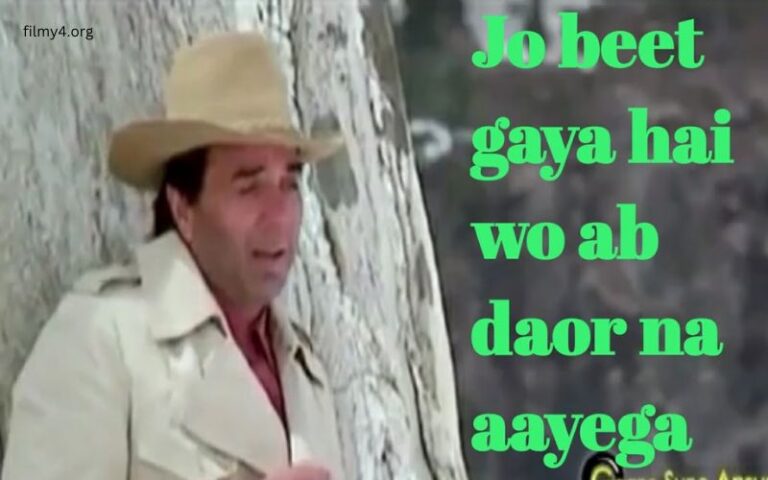In the vast landscape of Hindi film music, certain songs etch themselves into the collective memory of generations. “Jo Beet Gaya Hai Wo Ab Daur Na Aayega” is one such timeless gem. Penned by the legendary poet Kaifi Azmi and composed by the maestro Ravi Shankar, this song from the classic movie “Waqt” (1965) transcends the barriers of time and remains as poignant and relevant today as it was decades ago.
Jo Beet Gaya Hai Wo Ab Daur Na Aayega Lyrics
Jo Beet Gaya Hai Woh
Aab Daur Na Aayega.
Jo Beet Gaya Hai Woh
Aab Daur Na Aayega.
Is Dil Mein Siva Tere
Koi Aur Na Aayega
Koi Aur Na Aayega.
Jo Beet Gaya Hai Woh
Aab Daur Na Aayega,,
Uploded by @Dard_E_Tahai
Tu Saath Na De Mera
Chalna Mujhe Aata Hai.
Har Aag Se Waqif Hun
Jalna Mujhe Aata Hai.
Ye Jevan Ka Putla Jal Jaiy Bhi To Kya
Ye Jevan Ka Putla Jal Jaiy Bhi To Kya
Marne Ke Liye Aisa Koiy Daur Na Aayega
Jo Beet Gaya Hai Woh
Aab Daur Na Aayega.
Is Dil Mein Siva Tere
Koi Aur Na Aayega
Koi Aur Na Aayega.
Jo Beet Gaya Hai Woh
Aab Daur Na Aayega,,
Singer;Babla Mehta
Keep Enjoy All Of You
Historical Context
“Waqt,” a pioneering film of its time, depicted the struggles and triumphs of a family torn apart by fate.
The socio-political climate of the 1960s in India, marked by rapid modernization and changing societal norms, provided the backdrop for the film.
Kaifi Azmi’s lyrics resonated deeply with the audience, capturing the essence of resilience and hope amidst adversity.
Literary Analysis:
Kaifi Azmi’s mastery over language shines through in the profound simplicity of his words.
The opening lines, “Jo Beet Gaya Hai Wo Ab Daur Na Aayega, Is Jeevan Ka Yehi Hai Bas Meri Aadat Ban Gayi Hai,” encapsulate the essence of acceptance and moving forward in life.
Each stanza of the song delves into the cyclical nature of time, emphasizing the inevitability of change and the importance of embracing it.
Musical Brilliance
Ravi Shankar’s composition complements Azmi’s lyrics with its melodious arrangement.
The use of traditional Indian instruments combined with Western orchestration adds layers of depth to the song.
The haunting refrain, “Waqt Se Din Aur Raat, Waqt Se Kal Aur Aaj, Waqt Ki Har Shai Ghulam, Waqt Ka Har Shai Pehredar,” echoes the transient nature of time and its hold over every aspect of existence.
Philosophical Underpinnings
“Jo Beet Gaya Hai” serves as a philosophical treatise on the concept of time and human mortality.
It encourages introspection and acceptance of the past while urging individuals to seize the present moment.
The refrain, “Jis Ka Jikr Hai Yahan, Woh Rehguzar Kabhi Na Aayega,” imparts a sense of impermanence, urging listeners to cherish fleeting moments and relationships.
Enduring Legacy:
Despite being released over five decades ago, “Jo Beet Gaya Hai” continues to resonate with audiences across generations.
Its universal themes of resilience, acceptance, and the inevitability of change make it timeless.
The song has been covered and reinterpreted by numerous artists, further cementing its place in the annals of Hindi film music.
Cultural Impact
“Waqt” and its soundtrack, including “Jo Beet Gaya Hai,” left an indelible mark on Indian cinema.
The film’s portrayal of familial bonds and the passage of time struck a chord with audiences, making it a classic of Hindi cinema.
The song’s popularity transcends borders, finding admirers not only in India but also among fans of world music.
Conclusion
“Jo Beet Gaya Hai Wo Ab Daur Na Aayega” stands as a testament to the enduring power of music and poetry.
Kaifi Azmi’s evocative lyrics and Ravi Shankar’s soulful composition create a timeless masterpiece that resonates with listeners across generations.
As we navigate the complexities of life, this song serves as a guiding light, reminding us to embrace change, cherish the present, and find solace in the beauty of the human experience.
In conclusion, “Jo Beet Gaya Hai Wo Ab Daur Na Aayega” is more than just a song; it is a philosophical journey through the corridors of time, offering solace and wisdom to all who heed its message.
